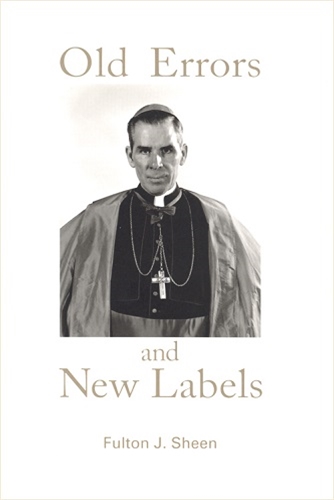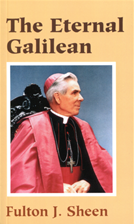Customer Reviews

OLD ERRORS AND NEW LABELS
Description
OLD ERRORS AND NEW LABELS
Author: Fulton J. Sheen
Copyright: 2007
First Printed: 05-30-2007
| Also available as an E-book | ||||
| Amazon Kindle | Apple Book | Nook Book | ||
“This book,” the author wrote in 1931, “is an attempt to judge contemporary ideals in the field of morals, religion, science, evolution, sociology, psychology and humanism in the light of that philosophical daylight called ‘common sense.’ If at times it criticizes certain views on the grounds of their unreasonableness, it does so to prepare for a view which seems more reasonable. If at other times it shows that what is wrong with a certain philosophical outlook is that it emphasizes a part against the whole, it does so in order to suggest a view that is more catholic in the sense of being the whole truth.” The extraordinary thing for the reader here at the beginning of the twenty-first century is that many of the “old errors” of seventy-five years ago are still cropping up with “new labels” today. There is no sympathy shown in these pages for those who believe that everything that is modern is best, nor with those who believe that everything that is modern is bad. The book does attempt to show, however, that what is often called “modern” is only a new label for an old error, and that what is called “behind the times” is really “beyond time” and outside of fashions because it is an expression of t he truth which is eternal.
About the Author: No reader who is familiar with the Servant of God, Archbishop Fulton J. Sheen (1895-1979) — either from his many other books or from his television appearances (presently being rerun on EWTN) — needs to be told of the extraordinary breadth of his interests and the wide-ranging extent of his library. He was truly a renaissance man in every sense of the word, someone who was very well read in theology, philosophy, literature, art, science and politics. The present work is a veritable treasure trove of wisdom and insight in all of these areas. That said, many of the citations to be found in this book, which was originally published in the early 1930’s, will probably be unfamiliar to many today, so it was felt that it might be helpful to add to Sheen’s flawless text a few footnotes to assist in a fuller appreciation of the depth and scope of his still relevant insights into these old errors with new labels.
Book: 222 pages
ISBN: 978-0-8189-1246-7
Prod. Code: 1246-4
Reviews
Archbishop Fulton J. Sheen is back. Even though he passed from this world to the next in 1979, his ideas and his arguments in defense of the faith are very much alive and helping many people -- both Catholic and non-Catholic. In recent years he has been seen often on EWTN by means of re-runs of his famous TV programs. Also during that time several of his many books have been reprinted.
Here is a reprint of a 1931 book from Alba House. Bishop Sheen was truly an amazing man. He was a first-class intellectual who knew how to speak to ordinary people and get their attention. In the 1950s on his weekly TV program he was seen by millions. I read somewhere, perhaps in his autobiography, that he received about eight thousand letters a day when he was at his peak in popularity.
Fame, however, did not go to his head. He remained a humble priest because he was a man of prayer. For fifty years he made a Holy Hour every day and said that he never missed a day.
What impresses me about Sheen is his ability to go directly to the heart of each question, analyze it in clear terms and explain it in concrete terms that all can understand. That is what he does in this book about old errors under new labels. Please note that the book was written in 1931, during the Depression, when the Soviet Union was beginning to cause international waves, most Americans were poor and Hitler was on the rise in Germany.
Given the cultural situation, Bishop Sheen in this book exposes many common errors that have been dressed up in technical language to make them look like something new. Accordingly, he points out that the so-called "new morality" is nothing more than the old immorality disguised in psychological terms.
Sheen is especially hard on scientists, such as Einstein, who at the time was the most eminent scientist in the world. Einstein was guilty of the same error that Plato exposed 2,400 years ago. It is the problem of the man who is an expert in one field who thinks he can pontificate in other areas, especially the area of religion. As Sheen points out, when scientists, who are experts at measuring material things, move into the fields of philosophy and theology, which deal with spiritual realities, they are no longer experts and are talking about things they know little or nothing about.
Other errors that he considers are contemporary atheism, humanitarianism, charity without God, education without God, relativism, Darwinian evolutionism, communism, behaviorism, positivism and the new Pelagianism. What is astonishing about Sheen's analysis of these errors, composed over seventy years ago, is that the errors are still with us and his refutation of them is just as valid today as it was in the 1930s.
Bishop Sheen loved the truth, sought the truth and expressed the truth in clear English that goes to the heart of the matter. Those old errors are still with us and Bishop Sheen unmasks them for us by speaking the truth. That is why Bishop Fulton J. Sheen never really grows old. --Kenneth Baker, S.J. in the July 2008 issue of Homiletic & Pastoral Review










